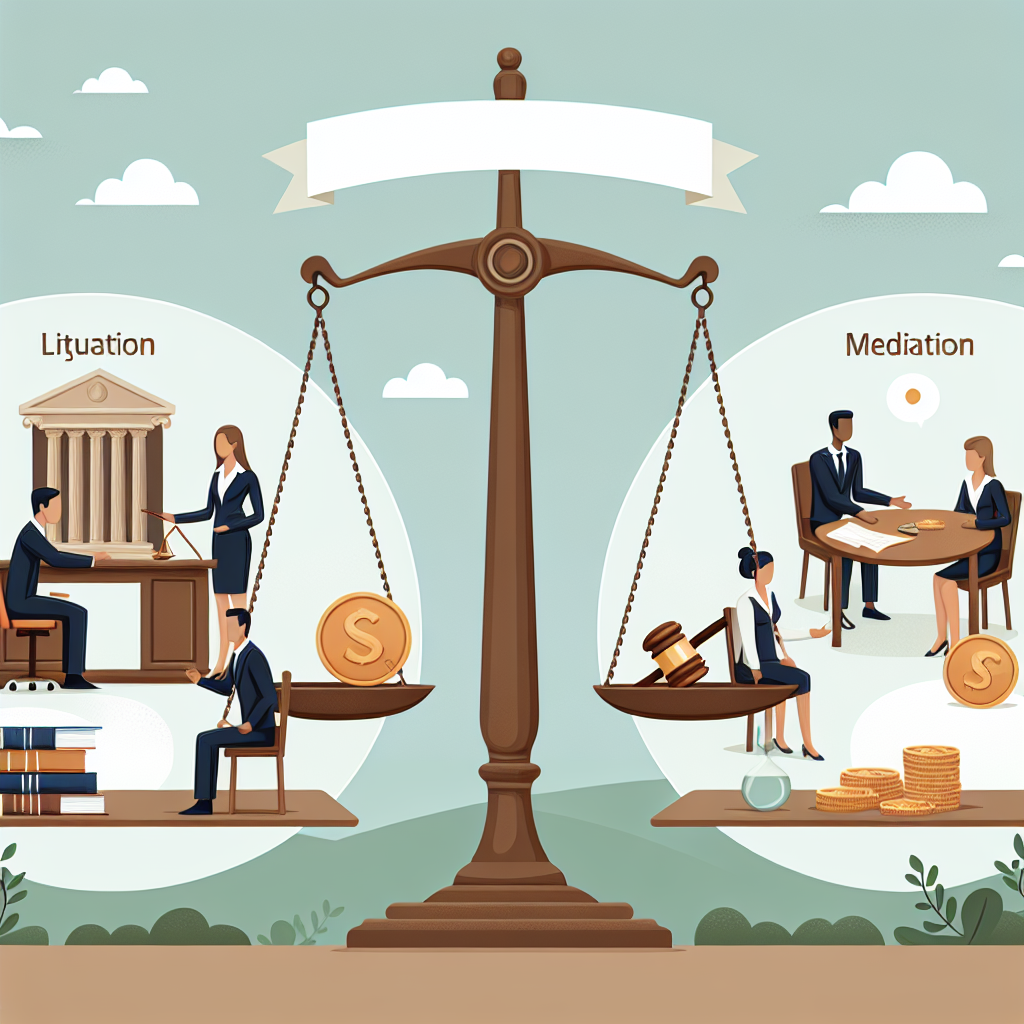Disputes can be a challenging aspect of life, whether in personal matters, business dealings, or legal issues. When faced with conflict, parties often find themselves at a crossroad: should they pursue litigation in court, or should they explore mediation as a resolution? This article will perform a thorough cost-benefit analysis of both options, highlighting key considerations to help you make the best decision.
Understanding Litigation and Mediation
Before diving into the cost-benefit analysis, it’s essential to understand what litigation and mediation entail.
What is Litigation?
Litigation is the formal process of resolving disputes through the court system. It involves filing a lawsuit and engaging in a series of procedures including discovery, trial, and potentially appeals. While litigation is often seen as the traditional means of dispute resolution, it can be time-consuming, expensive, and publicly accessible.
What is Mediation?
Mediation, on the other hand, is a more informal process that involves a neutral third-party mediator who facilitates discussions between the disputing parties. The goal is to find a mutually acceptable resolution without going to court. Mediation is typically less formal, more flexible, and can often be completed in a shorter time frame.
The Costs of Litigation
Financial Implications
Litigation can be extremely costly. Legal fees for attorneys, court costs, and expenses for expert witnesses can quickly add up. According to various studies, litigation costs can range from thousands to hundreds of thousands of dollars, depending on the case’s complexity and duration.
Time and Resources
Litigation can stretch on for months or even years. The time commitment not only drains monetary resources but also takes a toll on the emotional well-being of the parties involved. Often, people find themselves preoccupied with their case, which can lead to higher stress levels.
Public Visibility
Litigation is a public affair. Court records and proceedings are generally available for public viewing, which means sensitive information can become exposed to the scrutiny of the general public. For businesses, this could pose a significant reputational risk.
The Benefits of Litigation
Legal Precedent
One of the few benefits of litigation is that it establishes legal precedent. A court ruling can help clarify the law, providing guidance for similar disputes in the future. This aspect can be particularly beneficial for businesses or individuals wanting to set a standard.
Objective Judgment
Decisions made during litigation are legally binding and enforceable. A judge or jury evaluates the evidence and arguments presented, delivering a resolution based on law rather than negotiation, which can sometimes lead to feelings of unfairness.
Protection of Rights
In litigation, there are robust legal protections and formal procedures to ensure that each party’s rights are upheld. This structured environment can provide a sense of security and assurance to the parties involved.
The Costs of Mediation
Financial Considerations
Although mediation is generally less expensive than litigation, it is still important to note that mediators charge fees for their services. Depending on the complexity of the case, the costs can vary, although they are usually much lower than litigation expenses.
No Guaranteed Resolution
One significant downside of mediation is that there’s no guarantee a resolution will be reached. If parties fail to agree, they might have to revert to litigation, resulting in wasted time and resources.
The Benefits of Mediation
Cost-Effectiveness
Mediation often offers a more budget-friendly resolution compared to litigation. By reducing attorney fees and court expenses, parties can save substantial amounts of money.
Time Efficiency
Mediation sessions typically take far less time than the lengthy litigation process. Many disputes can be resolved in a matter of hours or days, allowing parties to move forward more quickly.
Privacy and Confidentiality
Unlike litigation, which is public, mediation sessions are confidential. This aspect allows parties to discuss issues candidly without the fear that their words will be made public or used against them later.
Empowering Control
In mediation, both parties retain control over the outcome. Rather than leaving the decision in the hands of a judge or jury, they collaboratively work toward a solution that satisfies both sides. This can lead to more satisfactory outcomes and improved relationships.
Making the Right Choice
When deciding between litigation and mediation, it’s important to consider specific factors relevant to your situation. Ask yourself these key questions:
- What is at stake? – For high-stakes matters involving significant sums of money or complex legal principles, litigation may be more appropriate.
- Can you maintain a working relationship? – If preserving a relationship is essential, mediation might be the better option as it fosters cooperation.
- What are your time constraints? – If you need a swift resolution, mediation typically offers speed.
- Are you comfortable with uncertainty? – If you prefer a clear, enforceable outcome, litigation provides that certainty.
Conclusion: Weighing Your Options
Both litigation and mediation have their pros and cons, and the right choice depends on the unique circumstances surrounding your dispute. By analyzing the costs and benefits of each option, you can make a more informed decision that aligns with your needs and goals.
Whether you choose to litigate or mediate, always consult with a qualified legal professional to guide you through the process and help you achieve the best possible outcome. After all, resolving disputes is not just about winning; it’s about finding closure and moving forward with your life.


